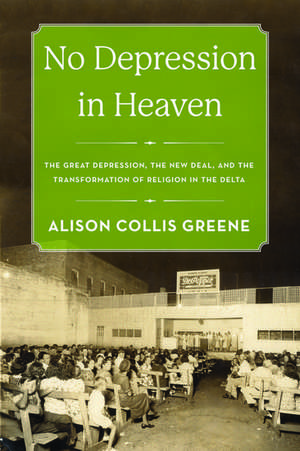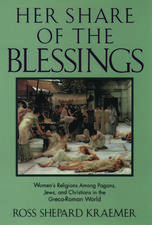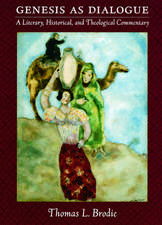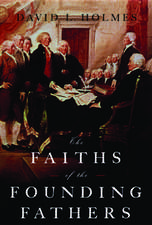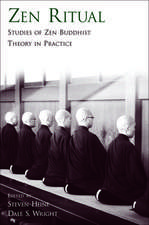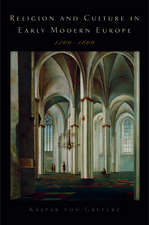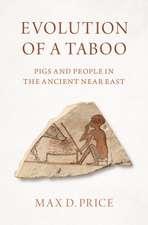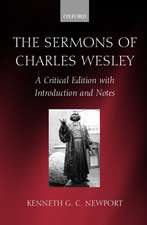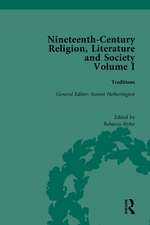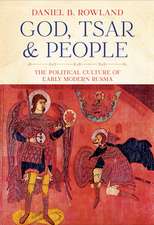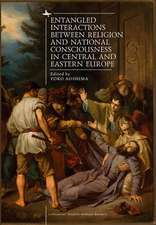No Depression in Heaven: The Great Depression, the New Deal, and the Transformation of Religion in the Delta
Autor Alison Collis Greeneen Limba Engleză Paperback – 16 noi 2017
| Toate formatele și edițiile | Preț | Express |
|---|---|---|
| Paperback (1) | 200.45 lei 10-16 zile | |
| Oxford University Press – 16 noi 2017 | 200.45 lei 10-16 zile | |
| Hardback (1) | 270.07 lei 31-37 zile | |
| Oxford University Press – 21 ian 2016 | 270.07 lei 31-37 zile |
Preț: 200.45 lei
Preț vechi: 246.55 lei
-19% Nou
Puncte Express: 301
Preț estimativ în valută:
38.36€ • 40.15$ • 31.92£
38.36€ • 40.15$ • 31.92£
Carte disponibilă
Livrare economică 27 februarie-05 martie
Preluare comenzi: 021 569.72.76
Specificații
ISBN-13: 9780190858315
ISBN-10: 0190858311
Pagini: 336
Ilustrații: 20 hts
Dimensiuni: 155 x 231 x 23 mm
Greutate: 0.48 kg
Editura: Oxford University Press
Colecția OUP USA
Locul publicării:New York, United States
ISBN-10: 0190858311
Pagini: 336
Ilustrații: 20 hts
Dimensiuni: 155 x 231 x 23 mm
Greutate: 0.48 kg
Editura: Oxford University Press
Colecția OUP USA
Locul publicării:New York, United States
Recenzii
[A]n eloquent and substantive contribution to American religious history of the interwar period. Few recent works can compete with Green's literary skills as she seamlessly crafts both compelling micro- and macro-narratives without sacrificing the argument....The combination of research and literary craft results in a work that belongs in the highest levels of academic discourse yet remains eminently accessible
There is much to like in No Depression in Heaven: clear evidence, strong prose, and wonderful use of sources...Greene's work is a beautifully written, wonderfully researched portrait of life and belief in the Delta during the Great Depression.
[A]n important book that should be of interest to those studying religion, economics, the 1930s, labor activism, and civil rights. This book is deeply researched, includes substantive crucial analysis, and is beautifully written.
Alison Collis Greene has written an evocative study of religion and politics in the Depression-era Mississippi Delta. Her discussion of flood, drought, and starvation has a biblical cadence, punctuated by a rhythm-and-blues riff Greene's analysis and evidence are of high caliber, and her writing is engrossing.
Greene makes an important point often overlooked by historians and certainly overlooked by many observers at the time: the religion of the poor was more a lived experience than one they expressed in a church building An important book that should be of interest to those studying religion, economics, the 1930s, labor activism, and civil rights. The book is deeply researched, includes substantive crucial analysis, and is beautifully written.
With the flare of a novelist and the urgency of a reformer, [Greene] guides the reader through grassroots America's encounter with catastrophe, pausing frequently to underscore common people's burdens but also to highlight their resilience and empowerment in the fight for survival As stellar history, rigorously researched and analyzed, it is a refreshing call for scholars to reorient their concerns away from the rigidities of the current moment, which paint the South solely as conservative hegemon, to the dynamism of an earlier day when the region served as a test-case for new directions in governance, civil society, and the church.
[Greene] offers a well-written and captivating narrative No Depression in Heaven adds substantially to our historical understanding of political and religious transformations in the Delta during the Great Depression. By exposing the evolution of church reactions to federal aid, from an initial welcoming response to growing skepticism and antagonism, Greene delivers a broader revelation of post-Depression fundamentalism...Greene's compelling narrative and innovative approach to the roots of modern fundamentalism make No Depression in Heaven extraordinarily beneficial to political, southern, and religious historians.
With No Depression in Heaven, Greene makes a powerful addition to a growing literature on the relationship between religion and political economy in the South, and in the United States in general, in the modern era. This beautifully written, deeply researched book is aimed primarily at historians of religion and politics, but will be of interest to anyone concerned with the moral dimensions of political economy.
No Depression in Heaven delivers even more than its ambitious title promises While No Depression in Heaven is a history of how religion changed in the Delta, it is also a thoughtful reminder of how interpersonal and structural racism, capitalism and economics, environmental degradation, and national, state, and local politics worked together to create a society marked by economic disparity and its attendant human suffering
No Depression in Heaven is a compelling and beautifully written story of the ways in which poverty, welfare, God, and Roosevelt shaped Americans' lives in the 1930s. Greene has provided an excellent history based on first-rate research that speaks in important ways to the present as much as to the past.
Combines powerful stories and brilliant historical analysis to reveal an important chapter in the reconfiguration of church-state relationships. A vital and important book. Essential. Upper-division undergraduates through faculty.
While historians have long understood the Great Depression as a decade of political and economic upheaval, Alison Collis Greene brilliantly demonstrates that it sparked a revolution in American religion too. With deeply grounded research and soaring prose, No Depression in Heaven forces us to rethink the tangled relationship between religion and politics in modern American history in innovative and exciting ways.
In her eloquent, incisive, and ultimately heart-breaking book, Alison Greene captures not only the excruciating local effects of the Great Depression, but the powerlessness of local religious institutions in the face of such extreme want. Her work shows us, in elegant prose, that the intensely local consequences of economic collapse in the American south, nourished by racism and myths of self-determination, grew to reshape both the nation and its memories of itself in crisis. No Depression in Heaven provides historians of religion in America an exemplary model for making sense of this devastating period in American history.
A gifted historian with a novelist's ear, Alison Greene discerns the texture of lived experience in the most recalcitrant sources. No Depression in Heaven is a masterful work of social history. Equally attentive to the intimate and the political, Greene shows how deeply fraught the responses of the people of the Delta were to the upheavals and transformations of the 1930s. She also demonstrates that religious history at its best is about how people fight, often in ways that are destructive to themselves and others, to make lives for themselves on the razor edge of change.
There is much to like in No Depression in Heaven: clear evidence, strong prose, and wonderful use of sources...Greene's work is a beautifully written, wonderfully researched portrait of life and belief in the Delta during the Great Depression.
[A]n important book that should be of interest to those studying religion, economics, the 1930s, labor activism, and civil rights. This book is deeply researched, includes substantive crucial analysis, and is beautifully written.
Alison Collis Greene has written an evocative study of religion and politics in the Depression-era Mississippi Delta. Her discussion of flood, drought, and starvation has a biblical cadence, punctuated by a rhythm-and-blues riff Greene's analysis and evidence are of high caliber, and her writing is engrossing.
Greene makes an important point often overlooked by historians and certainly overlooked by many observers at the time: the religion of the poor was more a lived experience than one they expressed in a church building An important book that should be of interest to those studying religion, economics, the 1930s, labor activism, and civil rights. The book is deeply researched, includes substantive crucial analysis, and is beautifully written.
With the flare of a novelist and the urgency of a reformer, [Greene] guides the reader through grassroots America's encounter with catastrophe, pausing frequently to underscore common people's burdens but also to highlight their resilience and empowerment in the fight for survival As stellar history, rigorously researched and analyzed, it is a refreshing call for scholars to reorient their concerns away from the rigidities of the current moment, which paint the South solely as conservative hegemon, to the dynamism of an earlier day when the region served as a test-case for new directions in governance, civil society, and the church.
[Greene] offers a well-written and captivating narrative No Depression in Heaven adds substantially to our historical understanding of political and religious transformations in the Delta during the Great Depression. By exposing the evolution of church reactions to federal aid, from an initial welcoming response to growing skepticism and antagonism, Greene delivers a broader revelation of post-Depression fundamentalism...Greene's compelling narrative and innovative approach to the roots of modern fundamentalism make No Depression in Heaven extraordinarily beneficial to political, southern, and religious historians.
With No Depression in Heaven, Greene makes a powerful addition to a growing literature on the relationship between religion and political economy in the South, and in the United States in general, in the modern era. This beautifully written, deeply researched book is aimed primarily at historians of religion and politics, but will be of interest to anyone concerned with the moral dimensions of political economy.
No Depression in Heaven delivers even more than its ambitious title promises While No Depression in Heaven is a history of how religion changed in the Delta, it is also a thoughtful reminder of how interpersonal and structural racism, capitalism and economics, environmental degradation, and national, state, and local politics worked together to create a society marked by economic disparity and its attendant human suffering
No Depression in Heaven is a compelling and beautifully written story of the ways in which poverty, welfare, God, and Roosevelt shaped Americans' lives in the 1930s. Greene has provided an excellent history based on first-rate research that speaks in important ways to the present as much as to the past.
Combines powerful stories and brilliant historical analysis to reveal an important chapter in the reconfiguration of church-state relationships. A vital and important book. Essential. Upper-division undergraduates through faculty.
While historians have long understood the Great Depression as a decade of political and economic upheaval, Alison Collis Greene brilliantly demonstrates that it sparked a revolution in American religion too. With deeply grounded research and soaring prose, No Depression in Heaven forces us to rethink the tangled relationship between religion and politics in modern American history in innovative and exciting ways.
In her eloquent, incisive, and ultimately heart-breaking book, Alison Greene captures not only the excruciating local effects of the Great Depression, but the powerlessness of local religious institutions in the face of such extreme want. Her work shows us, in elegant prose, that the intensely local consequences of economic collapse in the American south, nourished by racism and myths of self-determination, grew to reshape both the nation and its memories of itself in crisis. No Depression in Heaven provides historians of religion in America an exemplary model for making sense of this devastating period in American history.
A gifted historian with a novelist's ear, Alison Greene discerns the texture of lived experience in the most recalcitrant sources. No Depression in Heaven is a masterful work of social history. Equally attentive to the intimate and the political, Greene shows how deeply fraught the responses of the people of the Delta were to the upheavals and transformations of the 1930s. She also demonstrates that religious history at its best is about how people fight, often in ways that are destructive to themselves and others, to make lives for themselves on the razor edge of change.
Notă biografică
Alison Collis Greene is Associate Professor of History at Mississippi State University.
